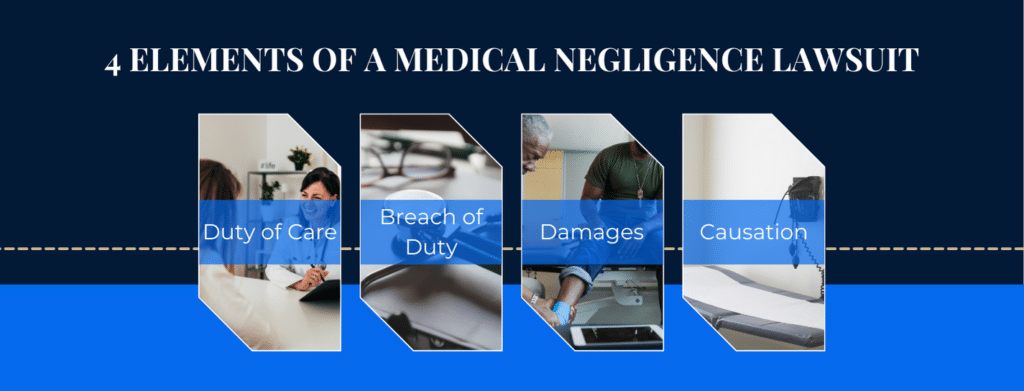How Do You Prove Medical Negligence in Florida?
To prevail in a medical malpractice lawsuit in Florida, you must prove that your injuries were more likely than not caused by a health care provider’s negligence. This burden of proof is known as a preponderance of the evidence. But how do you prove medical malpractice? You will need hard evidence linking your injuries to a health care provider’s negligence.
Fortunately, you don’t have to know how to prove medical malpractice yourself. We have over 20 years of experience proving medical negligence claims and have recovered over $2.6 billion in compensation. Our accomplished Florida medical malpractice lawyers have the resources, experience, and fortitude to take on big corporations, prove your claim, and win substantial compensation for you.
Establishing a Medical Malpractice Claim

Winning a medical malpractice claim requires that you prove that all of the following elements of negligence were present when you were injured:
- Duty of care. You had a patient-provider relationship with the defendant. Once a doctor provides treatment in exchange for compensation, a duty to provide the prevailing professional standard of care is established. The law defines the prevailing professional standard of care as the level of care and skill a reasonably prudent provider with similar qualifications would provide under the circumstances.
- Breach of duty. The doctor strayed from the prevailing accepted medical guidelines and failed to provide a reasonable standard of care.
- Damages. You suffered a verifiable injury that was not within the expected outcome for your condition, and the injury has resulted in measurable losses, such as medical expenses, lost wages, and pain and suffering.
- Causation. The breach of duty is the actual cause of your injury, and your injury would not have occurred were it not for the breach.
The most challenging element to prove is causation. You will need solid medical evidence to prove that your injuries were not the result of other variables, such as a preexisting condition or the progression of your health condition.
Evidence for a Medical Malpractice Claim
Medical malpractice claims are complex because they require you to go against wealthy health care corporations with specialized medical knowledge. They will hire their own medical experts to fight your claim. You will need an experienced medical malpractice attorney like ours who can fight fire with fire. We are ready to hit back with the same types of evidence and do all the work to get it for you.
We do extensive background searches on the opposing sides’ experts, often researching and reviewing past depositions they have given and medical articles they have authored. Oftentimes, if dedicated enough, our attorneys have found previous testimony that contradicts the testimony they are giving for your case.
Medical Records
You will need extensive medical records from all providers. Your past medical records will be necessary to prove that a preexisting injury or health condition did not contribute to your current injuries. Your current medical records will provide information about the medical negligence and the resulting injuries, including the following:
- Your diagnosis
- How the provider arrived at your diagnosis
- Imaging scans
- Laboratory test results
- Your treatment plan
- How well the provider documented your symptoms
- Your treatment outcomes
Expert Testimony
You will need expert witnesses to analyze your medical records and verify that your health care provider failed to follow established medical protocols and that your injury is the result of that failure and not something else. These witnesses must meet strict criteria under Florida law to testify and provide their opinion in court. Partner Deborah Gander discusses these requirements below.
Other Supporting Evidence
To support the medical findings of the experts, you will need evidence outside of your medical files, such as the testimony of doctors, nurses, and other witnesses.
Even if your injuries are obvious, you will need hard evidence to prove you were injured and establish the extent of the harm. In addition to your medical records, this evidence may include photographs, video footage, and the testimony of family members and caregivers who can verify the severity of your injuries and how they affect your daily life.
Before the court can award damages, it will need proof of how much the injury cost you, both in terms of finances and your quality of life. Admissible evidence of damages may include the following:
- Paystubs
- Medical bills
- Bank statements
- Credit reports
- Testimony from financial and vocational professionals
Let Us Do the Hard Work for You
Is medical malpractice hard to prove? Not when you have our accomplished attorneys on your side. We have experience on the other side, defending medical providers and their insurance companies, so we know their playbook. We will fight passionately and aggressively to maximize your compensation, with a focus on care and compassion for you. We want you to rest and recover. Contact us today using our online form or call (954) 467-6400 to schedule a free case evaluation.











